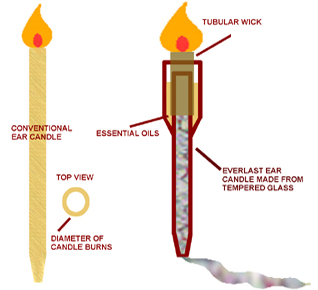Historically, there is evidence of ear candling (aka coning or funneling) throughout the timeline of civilization. Virtually every major group had some version of the practice.
Ancient Egyptians used papyrus rolled into a cone shape. Upper-class Greeks used candling to evoke mental clarity and a deeper spirituality. There's evidence of candling in cave drawings discovered in Europe. Oriental doctors of Thailand, China, India and the Philippines have included the process as a routine part of their regular practice of medicine. American Indians used reeds from the riverbank to relieve head congestion for candling purposes. Diaries translated from native dialects of African slaves describe the practice of candling as being widely used on the African continent.
Even today in modern Spain, Mexico, Greece, and Italy (to name but a few), the candling process is performed as a folk remedy usually by a designated family member for sinus problems, headaches, etc.
The actual process of candling was performed by a diverse cast of practitioners. In some cultures, the religious leader, holy man or shaman provided the service for members of the tribe or village. Other civilizations looked to the medicine man or healer to help them. Today, either a family member or neighbor is typically designated to treat community members. In America, wellness practitioners have assumed this role and thousands of people have found relief from a wide assortment of problems from tinnitus to chronic sinus infections.

A cone-shaped candle about 8-10 inches long is used for most sessions. It is made of muslin fabric that has been soaked in an aromatic herbal solution, then fashioned into a conical shape and allowed to dry. It is then dipped in beeswax to make the candle more substantive and so it will burn better (it resembles the paper cones used with cotton candy.)
The person lies on his/her side on a comfortable table. Usually a small towel is draped over the shoulder to safeguard the hair, neck and face. A barrier plate (heavy paper plate) is used to hold the candle in proper placement and to collect any drips of beeswax.
The candle is inserted into the opening of the ear canal (the auditory canal) - making sure placement is snug and comfortable with no smoke leaks. It is held in place by the client. The candle is lit. One may hear a faint sizzle sound as it burns. The volume of the sound will vary as to the extent of blockage and/or residue in the ear canal. A minimum of one candle per ear is recommended, with the option to use an additional candle as is appropriate. It usually takes about 30 minutes.
As the candle burns, warm smoke is guided into the ear canal. The resulting heat creates a vacuum which draws old wax and residue out of the ear and into the hollow core of the cone-shaped candle. Fluids are drawn from ears, sinuses, and lymph glands. As the material is extracted, blockages are reduced and/or eliminated, allowing the natural processes.
All clients have unique reactions to this process. Reports have included:
Of course, no medical claims, promises or guarantees can be made as to benefits. The only gauge to know if it works for you is by the way you feel!
What Does Not Happen During a Session:
This process is recommended for people who:
All these diverse types of people may derive benefit from this simple therapy.
If you are interested in pursuing ear-candling therapy, Sandra's Apothecary located in The Outlands Emporium carries ear-candling supplies.